In my first 48 years of life, I had never set foot in Las Vegas.
When I finally did, in early November, it turned out to be at a momentous time—my final night in Sin City featured the election of Donald Trump over Hillary Clinton to become the 45th President in U.S. history.
What are the odds that my inaugural trip to Vegas would coincide with not only the U.S. Presidential election but also the third Memory, Mental Calculation & Photographic Reading Olympiad (also known as the Zappos Memoriad)?
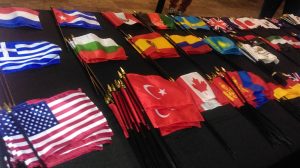
Does that last paragraph come across as a rhetorical question? If so, then you are not one of the myriad math phenoms who came from more than two dozen countries to compete. For them, questions of that sort are an invitation to put their remarkable minds to mathematical work.
Words do little justice to communicate the scope of these competitors’ abilities. So let me offer a story with more than a few numbers:
Until the 2016 Memoriad, the world record in the “Mental Calendar Dates” category—figuring out the day of the week for randomly assigned dates between 1600 and 2100—was 111. To break down that number, keep in mind that it represents 1.85 dates per second. Most people would be hard-pressed to actually read the month, day and year sequence that quickly, let alone translate it into a Tuesday or a Friday, or whatever day it fell on.
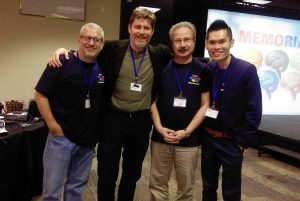
It wasn’t too long ago that doing 60 in one minute—or one per second—was akin to the 4-minute milestone for milers in the mid-1900s. And then Roger Bannister came along in 1954, proving it could be cracked—and then the floodgates opened and it’s now a routine thing for quality distance runners.
World’s Top Math Minds Pick up the Pace
The same sequence played out among the world’s top math minds. By 2010, the world record had moved up into the 70s and along the way, Jan van Koningsfeld of Germany frequently broke one record after another. Last year, when Jan got to 96 dates, it blew me away—especially as I had just learned how to compute calendar dates and knew the rapid processing required for me to average a correct date every five seconds or so.
That brings me to this personal aside: in November 2015, I learned a calendar system so that I could incorporate this skill into my Go Figure: Making Numbers Count presentations. Since then, I had computed days of the week based on oral quizzing: someone would state a date (usually from the 1900s, though I also learned the entire 1600-2100 span), and I would compute the day of the week. Typically, I would come up with an answer in five to seven seconds—sometimes in two seconds or less, but other times, especially if it was from the 1700s or even the 2000s, sputtering along at 10 seconds or more.
On the final day of my four-day visit supporting the Memoriad with social-media updates, I asked one of the many youngsters who had come from India if I could take a crack at the Memoriad software that randomly generates dates. How would I fare in a 60-second span?
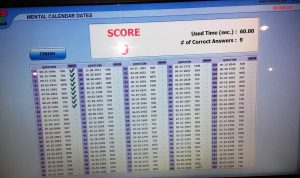
I scored a 9—about what I expected. A few minutes later, as the Mental Calendar Dates competition approached, I asked Memoriad chairman Scott “The Human Calculator” Flansburg if I could take a shot at competing (though my results would be unofficial, as I was not a registered competitor).
My Chance to Compete as a `Mathlete’ Arrives
After conferring with fellow Memoriad founder Melik Duyar, Scott graciously agreed to let me be among the 42 people—from grade-school age youngsters on up—who had traveled from all around the world to compete.
My goal in the five-round event: to get 10 dates. After scoring an 8, then a 9, I reached 10 in the third round—and repeated it in the final round. (I waged an ill-fated experiment in Round 4, programming the dates to appear, from left to right, as the day of the month, the month, and then the year. The approach threw this decidedly month-day of month-year guy for a loop, and I stumbled to a 5. Starting around the 4-hour mark of this video, you can see the Mental Calendar Dates competition.)
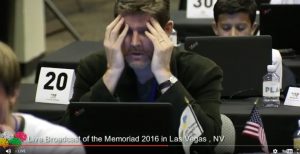
I had no illusions that my performance would wow anyone in the room (I finished 33rd–but first among Americans–after all, I was the only American competing!) So the real suspense was whether anyone had shattered the record of 111. That feat had been accomplished by “The Mental Calendar,” Yusnier Viera, an upbeat, personable Cuban who now lives in Miami. Poetically, he was serving as a referee at the Memoriad.
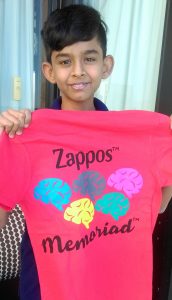
When the top three contestants (all from India) were announced, anticipation built: Shashank Jain had computed 83 dates, and Jainam Nayankumar Shah, only 12 years old, had tallied 89.
(Genuinely) Off-the-Charts
But those fantastic scores—both of which would have been world records in the not-too-distant past, were easily overshadowed by the off-the-charts (literally) performance of Jay Baldiya Jain. This 14-year-old had not only correctly assigned days of the week for all 125 dates on the screen, but he had done so with 3.18 seconds to spare, meaning he averaged 2.2 dates per second and was on pace to score 132 in a full minute.
And that only offers a brief glimpse of the collective brainpower, from boys and girls as well as men and women, at the Memoriad. The two youngest competitors, both from India, were a mere 5 years old. Among the other competitions were Speed Cards, Binary Digits, Mental Square Roots, Names and Faces, and Speed Reading.
In all, prize money totaled $33,000. But for me, meeting and watching these remarkable “mathletes” and other world-class individuals transcended any dollar amount. It was a truly priceless experience, at once both humbling and inspiring.
Related Posts:
A Figure for Math Change: `The Human Calculator’ Makes Numbers Count
A First: My Numbers Cameo in GO Magazine
